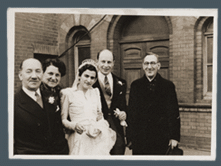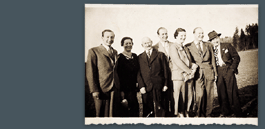 |
|
|
|
 This
Leica camera belonged to passenger Oskar Blechner. Like most emigres from
Nazi Germany, he was permitted to take out only a small amount of money.
In case of emergency, items, such as camers, could be sold. Loan courtesy
of Anthony Blechner This
Leica camera belonged to passenger Oskar Blechner. Like most emigres from
Nazi Germany, he was permitted to take out only a small amount of money.
In case of emergency, items, such as camers, could be sold. Loan courtesy
of Anthony Blechner |
|
|
|
|

Oskar
Blechner, sitting on deck, summer 1939
|
|
|
|
|
|
|
|
|
|
|
|
|
|
Polish-born
Mordechai (Markus) and Mina Blechner raised their four sons Oskar, Salo,
Jakob, and Leo in Munich during the interwar period. After the Nazis came
to power, Oskar and Salo moved to Berlin and worked in a trouser factory.
In October 1938 the Blechners were among the 17,000 Polish Jews the Gestapo
forcibly expelled from the Reich into Poland. |
|
|
|
|
|
The
Blechners soon returned to Germany but realized the need to emigrate as
Nazi persecution of the Jews increased. Leo left for the United States;
Jakob emigrated to Switzerland. Oskar boarded the St. Louis for Cuba to
await his number on the Polish quota for America. |
|
|
|

Oskar Blechner's Polish passport, showing English immigration stamp
prohibiting him from working. |
|
|
|
|
|
When
the ship returned to Europe, Oskar went to England and survived the
war in relative safety. Through Jakob, Oskar learned the fate of his
family. In late August 1939, Swiss border officials turned his parents
and brother Salo back to Nazi Germany. Only days later, Mordechai was
taken to Buchenwald, where he was killed. Salo was arrested and sent
to the Sachsenhausen concentration camp. Their mother Mina was deported
in November 1941 to Kovno, Lithuania, where she was killed.
Salo
withstood slave labor in the concentration camps of Neuengamme, Auschwitz-Monowitz,
and Dora-Mittelbau. He was liberated at the Bergen-Belsen camp by British
troops on April 15, 1945.
|
|
|
|
|
 Oskar
and Gwen Blechner's wedding day. March 8, 1942.
Oskar
and Gwen Blechner's wedding day. March 8, 1942. |
|
|
|
|
|
|
|
|
|
|
|

 |
|
|
|
|
|

|
The
Blechner family website is not a product of Museum research. Therefore,
the Museum cannot guarantee the accuracy of the information provided on
the Blechner website, and the Museum disclaims responsibility for any
errors in the information provided. |
|
|
|
 |
 |
 |
 |
 |
 |
 |
 |
 |
 |
 |
 |
 |
 |